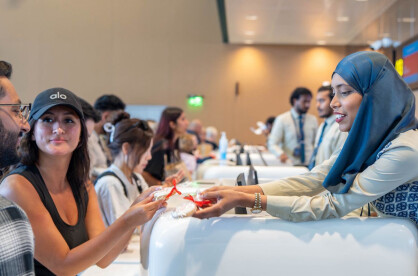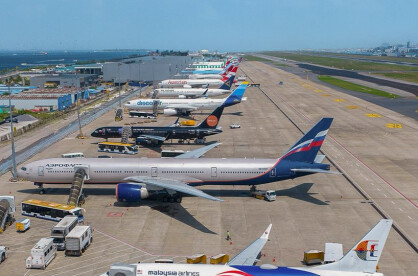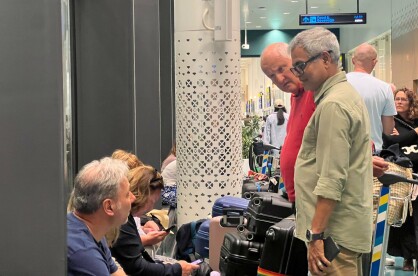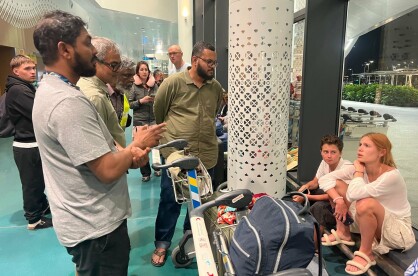Dr. Abdulla Mausoom — pushing the tourism envelope
MFR sat down with the Minister where he discussed his vision for tourism in the Maldives.

Source: Ministry of Tourism
MFR sat down with the Minister where he discussed his vision for tourism in the Maldives.

Source: Ministry of Tourism
Maldives, a name synonymous with tourism and luxury, has endured in this fast-paced global economy due to the hospitality industry. The helm of this industry is manned by the Tourism Ministry, and with the previous Minister appointed by the Solih Administration having faced a dishonourable discharge, the stakes are high.
However, Dr. Abdulla Mausoom revels in the challenge before him.
The tourism industry can be loosely described as the face of the Maldives to the global public. While immensely talented Maldivian diplomats handle the ins and outs of global politics, the hospitality frontier determines the monetary inflow that has been sustaining the country, and also giving the nation its economic freedom in both settling debt and also developing infrastructure.
As the country faces public finance difficulties due to the reduced revenue, the hospitality sector has been building up to a boom this year. The pandemic had brought the whole world to a halt, and times were indeed desperate. When Dr. Mausoom got the call to forego his diplomatic portfolio as Ambassador to Singapore, as well as his non-resident posts for New Zealand and Australia, and return to his former field of expertise, he accepted with enthusiasm.
Dr. Mausoom has been contributing to the hospitality industry since 1985. Decades upon decades of work left him feeling disillusioned and losing the passion he used to have, until he followed his other passion of environmentalism. Having served as the Minister of Environment, he was offered the chance to attend multiple conferences and involve himself on the global stage, alighting the truth that he definitely was more of an environmentalist than a tourism specialist. Still, with a lot of hopping between fields, he has now returned, and he insists he feels lucky to have found himself in this situation.
When my friends called me up and asked me to return to the tourism sector and serve as the Minister, I was very excited. This was going to be a challenge for me, and that was what I was looking forward to the most.
Anyone else would have first found the legacy left by the previous leadership of the Ministry as daunting, and the breakdown in trust and reputability of the industry as a whole would feel like an impossible task to regain within the rest of the administrative term. However, against all advice, Dr. Mausoom refused to replace the team that had worked with the previous minister, instead opting to work with them, and the results are nothing short of spectacular, compared to what the people have begun to expect from this administration’s Ministry of Tourism.
Dr. Mausoom sees the Ministry no longer just as civil servants and political appointees, but as his team and teammates. They have been working tirelessly under his captainship not only to patch up a misled industry but to utilise the silver linings created by COVID-19.
I didn't want to replace anyone, even the political appointees. I worked with them, and now they have been making magic. We are no longer just political appointees and civil servants, but we are the Tourism Ministry Team.
Being geographically isolated meant that border control was going to be a lot easier; and to combat the viral outbreak and to avoid introducing variants into the local populace. However, staying isolated is obviously not an option for a nation dependant so heavily on tourism, and to incentivise people travelling to the Maldives requires a modicum of trust. To this end, Dr. Mausoom rightfully points out the Maldivian COVID-19 reporting strives to be one of the most transparent in the world. Constant updates, test records being tracked and visible, and even vaccination drives achieving benchmarks meant that at a glance, the Maldives was safe enough to visit.

On top of that, the ministry has been working tirelessly to establish standards to which hospitality accommodations had to adhere to, to ensure safety on site. Most of the resort franchises have taken steps above and beyond this, using their levels of sophistication as a marketing tool as well. This altogether had not only bounced back tourism almost unbelievably, but at a rapid enough rate to break the visitation records set in the previous years.
Dr. Mausoon believes this is just the first step, and intends to move onto the real reason he returned to this industry; the evolution of Maldivian tourism.
Previously, islands were being leased off at a controlled number to ensure scarcity and to drive up prices, but this strategy hasn’t worked as well as it should have, Dr. Mausoom points out. Instead, he proposes putting up all viable islands for tourism development at the same time, but to adjust the investment schemes.
Instead of letting a party have control over an island for long leases without checks and balances, now the new contracts would stipulate that once an island is acquired, a functional resort needs to be operational within three years of the contract being signed. If they fail to deliver, the government reclaims ownership and gives the opportunity for another investor to have their chance at developing the island.
This is further emboldened by adding on the caveat that within 18 months, development work should have been started too. If the island is left untouched within this time, then the government reserves the right to reclaim the real estate as they believe a proper resort project would take roughly a year and six months to be completed to an operational level, so once 18 months has passed from the signing of the contract, only another 18 months would remain, and foretelling the delay in getting a return on investment, the contract can be voided.
These restrictions and pressures are not to promote cancellation of contracts or to levy heavy fines on those non-compliant, but to ensure the government and the people do not lose out on an income option and run a loss of potential earnings. He believes that by further establishing a lowest possible price for sale, the increase in supply would not undervalue the islands either, further combating the fallibility of the previous method of leasing islands for development. The effects, however, are yet to be seen.
Major changes are being brought to the Maldives Tourism Act to accommodate this change in strategies, and he doesn’t intend to stop there.
You need to understand that research is important, to understand the market, and also when developing local tourism, to understand the communities that live where the business is being developed. It is an easy work to get started on, but it would take determination and commitment to be succesful.
Dr. Mausoom believes the Maldives is ready for a reclassification of types of resorts, modelled after international concepts worldwide. From having ‘economy’ resorts aimed for the middle-income travellers, luxury resorts on a higher tier, and then also introducing the classification of Ultra Luxury destinations would, he states, create even more market opportunity for the Maldives.
To cater to this market expansion, Dr. Mausoom believes there needs to be ‘critical volume’ in tourism, and that means the 52,000 bed capacity of the Maldives needs to be doubled as soon as possible. However, when asked if this would tarnish the image of ‘luxury’ by doing away with scarcity, he responded that with the new classifications, luxury resorts would retain their statuses and lower-tier resorts would be the most prominent push for this critical volume.
Furthermore, one major aspect of development is in the local tourism sector.
With the advent of home-stay tourism as a workable concept, Dr. Mausoom believes that the industry would directly benefit the people of the country. Changes to policies in ownership, management, and even at a staff level, are in the works to bridge the income flows from tourism to the communities.
Dr. Mausoom proudly claims that 2022 is going to be the golden year of Maldivian Tourism. He aims to make Maldives the safest destination in the world, a destination that can cater to all levels of the market, from students, adventurers, families, to the ultra rich. Diversifying the market outreach would be paramount in fortifying the Maldivian brand.
Local tourism should expect to be a part of this boom, and the changes to policies would make sure the opportunities are present for everyone. Dr. Mausoom’s advice for those new to the field is to think of uniqueness and clear-cut, scalable targets, and to ensure proper research of the market, the proposed concept, as well as the communities involved. The Maldives can now expect, if all goes well, a truly inclusive tourism industry, and a chance to expand on the one-island, one-resort concepts.



